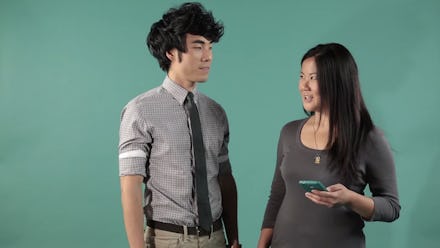The Internet Had a Chance to "Ask an Asian" Anything. The Results Prove an Important Point

Why do Asians wear masks? Why are they such bad drivers?
These are two of the questions comedian Jenny Yang addresses in BuzzFeed's video series, "Ask An Asian," which tackles racist stereotypes, one ignorant question at a time.
BuzzFeed received thousands of submissions with questions. In the below video, Yang answers 11 of them in BuzzFeed's idiosyncratic sarcastic style. She also gets help from Eugene Lee, a frequent face in the video series who was also featured in a video about micro-aggressions faced by Asians.
Yang shows that sometimes humor is the best way to tackle racism. Hers deftly reveals the flawed logic that so often informs racist thoughts.
Laughter is the best rebuttal: By reading the questions aloud, Yang exposes the extent to which racism still saturates our understanding of various ethnic groups. But her answers might be even better.
For example, in the question she answers about why all Asians seem to stick together in "enclaves," Yang points out the fact that most of the world operates in similar "enclaves," or small groups, from families to social circles that stick together because they have things in common.
"White people have enclaves too," she said. "Wall Street, the entertainment industry, Utah. They're not impenetrable. Just harder."
Of course, humor isn't always sufficient. Yang can't explain the root causes of racism and to attempt to write these issues off as a joke might actually be less helpful to those attempting to seriously contemplate their use of language. Language has different value and meaning depending on who is speaking, who is listening and where it is heard. This is particularly true of taboo language. Just look at the controversy surrounding Margaret Cho's impersonation of Kim Jong Un at the Golden Globe Awards last month. Cho was roundly chastised for being racist. In response, Cho too resorted to humor:
Cho told BuzzFeed her tweets were a reaction to people dictating how Asians are allowed to act in the world: "You're putting expectations on us that we have to remain Asian-American, that we can't actually play people from Asia. When we have British people playing American icons, there's no backlash. But for Asian-Americans, it's a very particular set of expectations that we are set to maintain, and that in itself is racist."
"If it's Asian-Americans making fun of Asians, we're claiming our own voice, we're claiming our heritage," she said. "We're claiming all of the aspects of our own culture, and we're allowed to. Even though it may get us put in a labor camp."
While Yang dropped the ball in terms of some of the more nuanced aspects of language and racism, she certainly manages to point out many of the glaring hypocrisies surrounding how non-Asian cultures think about Asians.